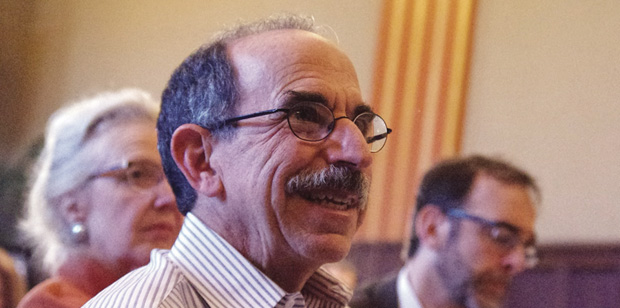
[+PHOTO]
A Force Behind Berkeley's New Food Mission
Bob Epstein's kids are picky eaters. You wouldn't think he'd pay much attention though, since both of his boys are grown and out of the house. But it's not about turning up their noses at a specific dish. Instead, the Epstein family's preferences run more toward a massive overhaul of the whole world's food systems.
As a co-founder of five companies, including software giant Sybase, Epstein, B.S. '74, M.S. '76, and Ph.D. '80 Electrical Engineering and Computer Sciences, is not somebody who is afraid of big challenges. So when Bob, his wife Amy, and their children came to a consensus that they wanted their family foundation to focus on food, he immediately set to work.
They gave themselves three goals: establishing an institute for the study of food, working on access to quality food for K–12 students, and eliminating antibiotics in healthy animals within 10 years. If that sounds like a lot to handle, Epstein seems unfazed. "I'm just determined," he says. "Not unreasonably optimistic. That's the essence of being an entrepreneur: If you can get the subject under your own control, you can solve it."
In addition to the family foundation's initial contribution to the Berkeley Food Institute of $75,000 and ongoing funding of $50,000 annually for four years, Epstein is taking a remarkably hands-on approach to getting the new institute off the ground.
Berkeley Food Institute Founding Donors
The 11th Hour Project of the Schmidt Family Foundation The Epstein/Roth Foundation Debra and Reza Abbaszadeh Lynn Feintech and Tony Bernhardt Debra and Robin Hicks Noelle Leca and Michael Moradzadeh Local Initiatives Fund of RSF Social Finance Ali Partovi Steve Silberstein Dana and Edward Slatkin Jennifer Solow and Tom Jacoby
"Bob is a force of nature," says Henry Brady, dean of the Goldman School of Public Policy, where Epstein serves on the board of advisors. "I know few people who are better at defining what they want to do and then figuring out how to get there."
Epstein has been involved with the BFI from the very beginning, and he estimates that he works about one-quarter time on the project. Not only has he been incredibly successful at soliciting new donors, but his entrepreneurial instincts and corporate know-how have been invaluable to an institute that seeks to stretch beyond the traditional boundaries of academia.
Despite his successes, which include helping secure additional seed funding from the 11th Hour Project of the Schmidt Family Foundation, Epstein calls food "the hardest thing I've ever worked on." And that means a lot coming from a man who shepherded two anti-global warming bills through California's legislature by way of Environmental Entrepreneurs (E2), a group he founded. Unlike with software, "You can't solve the problem just by changing the product," he says. "We need food to come from natural sources."
Difficulties aside, Epstein sees food as a potentially unifying issue in this age of political division. "Here's the opportunity to build something that has broad political strength rather than polarization," he says. "Nobody wants to eat poison." And that's something that even the fussiest eaters can agree on.
